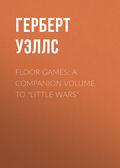
Герберт Джордж Уэллс
Mr. Britling Sees It Through
§ 2
Cissie lay awake that night thinking about her sister as if she had never thought about her before.
She began to weigh the concentrated impressions of a thousand memories. She and her sister were near in age; they knew each other with an extreme intimacy, and yet it seemed to Cissie that night as though she did not know Letty at all. A year ago she would have been certain she knew everything about her. But the old familiar Letty, with the bright complexion, and the wicked eye, with her rebellious schoolgirl insistence upon the beautifulness of "Boof'l young men," and her frank and glowing passion for Teddy, with her delight in humorous mystifications and open-air exercise and all the sunshine and laughter of life, this sister Letty, who had been so satisfactory and complete and final, had been thrust aside like a mask. Cissie no longer knew her sister's eyes. Letty's hand had become thin and unfamiliar and a little wrinkled; she was sharp-featured and thin-lipped; her acts, which had once been predictable, were incomprehensible, and Cissie was thrown back upon speculations. In their schooldays Letty had had a streak of intense sensibility; she had been easily moved to tears. But never once had she wept or given any sign of weeping since Teddy's name had appeared in the casualty list… What was the strength of this tragic tension? How far would it carry her? Was Letty really capable of becoming a Charlotte Corday? Of carrying out a scheme of far-seeing vengeance, of making her way through long months and years nearer and nearer to revenge?
Were such revenges possible?
Would people presently begin to murder the makers of the Great War? What a strange thing it would be in history if so there came a punishment and end to the folly of kings!
Only a little while ago Cissie's imagination might have been captured by so romantic a dream. She was still but a year or so out of the stage of melodrama. But she was out of it. She was growing up now to a subtler wisdom. People, she was beginning to realise, do not do these simple things. They make vows of devotion and they are not real vows of devotion; they love – quite honestly – and qualify. There are no great revenges but only little mean ones; no life-long vindications except the unrelenting vengeance of the law. There is no real concentration of people's lives anywhere such as romance demands. There is change, there is forgetfulness. Everywhere there is dispersal. Even to the tragic story of Teddy would come the modifications of time. Even to the wickedness of the German princes would presently be added some conflicting aspects. Could Letty keep things for years in her mind, hard and terrible, as they were now? Surely they would soften; other things would overlay them…
There came a rush of memories of Letty in a dozen schoolgirl adventures, times when she had ventured, and times when she had failed; Letty frightened, Letty vexed, Letty launching out to great enterprises, going high and hard and well for a time, and then failing. She had seen Letty snivelling and dirty; Letty shamed and humiliated. She knew her Letty to the soul. Poor Letty! Poor dear Letty! With a sudden clearness of vision Cissie realised what was happening in her sister's mind. All this tense scheming of revenges was the imaginative play with which Letty warded off the black alternative to her hope; it was not strength, it was weakness. It was a form of giving way. She could not face starkly the simple fact of Teddy's death. That was too much for her. So she was building up this dream of a mission of judgment against the day when she could resist the facts no longer. She was already persuaded, only she would not be persuaded until her dream was ready. If this state of suspense went on she might establish her dream so firmly that it would at last take complete possession of her mind. And by that time also she would have squared her existence at Matching's Easy with the elaboration of her reverie.
She would go about the place then, fancying herself preparing for this tremendous task she would never really do; she would study German maps; she would read the papers about German statesmen and rulers; perhaps she would even make weak attempts to obtain a situation in Switzerland or in Germany. Perhaps she would buy a knife or a revolver. Perhaps presently she would begin to hover about Windsor or Sandringham when peace was made, and the German cousins came visiting again…
Into Cissie's mind came the image of the thing that might be; Letty, shabby, draggled, with her sharp bright prettiness become haggard, an assassin dreamer, still dependent on Mr. Britling, doing his work rather badly, in a distraught unpunctual fashion.
She must be told, she must be convinced soon, or assuredly she would become an eccentric, a strange character, a Matching's Easy Miss Flite…
§ 3
Cissie could think more clearly of Letty's mind than of her own.
She herself was in a tangle. She had grown to be very fond of Mr. Direck, and to have a profound trust and confidence in him, and her fondness seemed able to find no expression at all except a constant girding at his and America's avoidance of war. She had fallen in love with him when he was wearing fancy dress; she was a young woman with a stronger taste for body and colour than she supposed; what indeed she resented about him, though she did not know it, was that he seemed never disposed to carry the spirit of fancy dress into everyday life. To begin with he had touched both her imagination and senses, and she wanted him to go on doing that. Instead of which he seemed lapsing more and more into reiterated assurances of devotion and the flat competent discharge of humanitarian duties. Always nowadays he was trying to persuade her that what he was doing was the right and honourable thing for him to do; what he did not realise, what indeed she did not realise, was the exasperation his rightness and reasonableness produced in her. When he saw he exasperated her he sought very earnestly to be righter and reasonabler and more plainly and demonstrably right and reasonable than ever.
Withal, as she felt and perceived, he was such a good thing, such a very good thing; so kind, so trustworthy, with a sort of slow strength, with a careful honesty, a big good childishness, a passion for fairness. And so helpless in her hands. She could lash him and distress him. Yet she could not shake his slowly formed convictions.
When Cissie had dreamt of the lover that fate had in store for her in her old romantic days, he was to be perfect always, he and she were always to be absolutely in the right (and, if the story needed it, the world in the wrong). She had never expected to find herself tied by her affections to a man with whom she disagreed, and who went contrary to her standards, very much as if she was lashed on the back of a very nice elephant that would wince to but not obey the goad…
So she nagged him and taunted him, and would hear no word of his case. And he wanted dreadfully to discuss his case. He felt that the point of conscience about the munitions was particularly fine and difficult. He wished she would listen and enter into it more. But she thought with that more rapid English flash which is not so much thinking as feeling. He loved that flash in her in spite of his persuasion of its injustice.
Her thought that he ought to go to the war made him feel like a renegade; but her claim that he was somehow still English held him in spite of his reason. In the midst of such perplexities he was glad to find one neutral task wherein he could find himself whole-heartedly with and for Cissie.
He hunted up the evidence of Teddy's fate with a devoted pertinacity.
And in the meanwhile the other riddle resolved itself. He had had a certain idea in his mind for some time. He discovered one day that it was an inspiration. He could keep his conscientious objection about America, and still take a line that would satisfy Cissie. He took it.
When he came down to Matching's Easy at her summons to bear his convincing witness of Teddy's fate, he came in an unwonted costume. It was a costume so wonderful in his imagination that it seemed to cry aloud, to sound like a trumpet as he went through London to Liverpool Street station; it was a costume like an international event; it was a costume that he felt would blare right away to Berlin. And yet it was a costume so commonplace, so much the usual wear now, that Cissie, meeting him at the station and full of the thought of Letty's trouble, did not remark it, felt indeed rather than observed that he was looking more strong and handsome than he had ever done since he struck upon her imagination in the fantastic wrap that Teddy had found for him in the merry days when there was no death in the world. And Letty too, resistant, incalculable, found no wonder in the wonderful suit.
He bore his testimony. It was the queer halting telling of a patched-together tale…
"I suppose," said Letty, "if I tell you now that I don't believe that that officer was Teddy you will think I am cracked… But I don't."
She sat staring straight before her for a time after saying this. Then suddenly she got up and began taking down her hat and coat from the peg behind the kitchen door. The hanging strap of the coat was twisted and she struggled with it petulantly until she tore it.
"Where are you going?" cried Cissie.
Letty's voice over her shoulder was the harsh voice of a scolding woman.
"I'm going out – anywhere." She turned, coat in hand. "Can't I go out if I like?" she asked. "It's a beautiful day… Mustn't I go out?.. I suppose you think I ought to take in what you have told me in a moment. Just smile and say 'Indeed!' … Abandoned! – while his men retreated! How jolly! And then not think of it any more… Besides, I must go out. You two want to be left together. You want to canoodle. Do it while you can!"
Then she put on coat and hat, jamming her hat down on her head, and said something that Cissie did not immediately understand.
"He'll have his turn in the trenches soon enough. Now that he's made up his mind… He might have done it sooner…"
She turned her back as though she had forgotten them. She stood for a moment as though her feet were wooden, not putting her feet as she usually put her feet. She took slow, wide, unsure steps. She went out – like something that is mortally injured and still walks – into the autumnal sunshine. She left the door wide open behind her.
§ 4
And Cissie, with eyes full of distress for her sister, had still to grasp the fact that Direck was wearing a Canadian uniform…
He stood behind her, ashamed that in such a moment this fact and its neglect by every one could be so vivid in his mind.
§ 5
Cissie's estimate of her sister's psychology had been just. The reverie of revenge had not yet taken a grip upon Letty's mind sufficiently strong to meet the challenge of this conclusive evidence of Teddy's death. She walked out into a world of sunshine now almost completely convinced that Teddy was dead, and she knew quite well that her dream of some dramatic and terrible vindication had gone from her. She knew that in truth she could do nothing of that sort…
She walked out with a set face and eyes that seemed unseeing, and yet it was as if some heavy weight had been lifted from her shoulders. It was over; there was no more to hope for and there was nothing more to fear. She would have been shocked to realise that her mind was relieved.
She wanted to be alone. She wanted to be away from every eye. She was like some creature that after a long nightmare incubation is at last born into a clear, bleak day. She had to feel herself; she had to stretch her mind in this cheerless sunshine, this new world, where there was to be no more Teddy and no real revenge nor compensation for Teddy. Teddy was past…
Hitherto she had had an angry sense of being deprived of Teddy – almost as though he were keeping away from her. Now, there was no more Teddy to be deprived of…
She went through the straggling village, and across the fields to the hillside that looks away towards Mertonsome and its steeple. And where the hill begins to fall away she threw herself down under the hedge by the path, near by the stile into the lane, and lay still. She did not so much think as remain blank, waiting for the beginning of impressions…
It was as it were a blank stare at the world…
She did not know if it was five minutes or half an hour later that she became aware that some one was looking at her. She turned with a start, and discovered the Reverend Dimple with one foot on the stile, and an expression of perplexity and consternation upon his chubby visage.
Instantly she understood. Already on four different occasions since Teddy's disappearance she had seen the good man coming towards her, always with a manifest decision, always with the same faltering doubt as now. Often in their happy days had she and Teddy discussed him and derided him and rejoiced over him. They had agreed he was as good as Jane Austen's Mr. Collins. He really was very like Mr. Collins, except that he was plumper. And now, it was as if he was transparent to her hard defensive scrutiny. She knew he was impelled by his tradition, by his sense of fitness, by his respect for his calling, to offer her his ministrations and consolations, to say his large flat amiabilities over her and pat her kindly with his hands. And she knew too that he dreaded her. She knew that the dear old humbug knew at the bottom of his heart quite certainly that he was a poor old humbug, and that she was in his secret. And at the bottom of his heart he found himself too honest to force his poor platitudes upon any who would not be glad of them. If she could have been glad of them he would have had no compunction. He was a man divided against himself; failing to carry through his rich pretences, dismayed.
He had been taking his afternoon "constitutional." He had discovered her beyond the stile just in time to pull up. Then had come a fatal, a preposterous hesitation. She stared at him now, with hard, expressionless eyes.
He stared back at her, until his plump pink face was all consternation. He was extraordinarily distressed. It was as if a thousand unspoken things had been said between them.
"No wish," he said, "intrude."
If he had had the certain balm, how gladly would he have given it!
He broke the spell by stepping back into the lane. He made a gesture with his hands, as if he would have wrung them. And then he had fled down the lane – almost at a run.
"Po' girl," he shouted. "Po' girl," and left her staring.
Staring – and then she laughed.
This was good. This was the sort of thing one could tell Teddy, when at last he came back and she could tell him anything. And then she realised again; there was no more Teddy, there would be no telling. And suddenly she fell weeping.
"Oh, Teddy, Teddy," she cried through her streaming tears. "How could you leave me? How can I bear it?"
Never a tear had she shed since the news first came, and now she could weep, she could weep her grief out. She abandoned herself unreservedly to this blessed relief…
§ 6
There comes an end to weeping at last, and Letty lay still, in the red light of the sinking sun.
She lay so still that presently a little foraging robin came dirting down to the grass not ten yards away and stopped and looked at her. And then it came a hop or so nearer.
She had been lying in a state of passive abandonment, her swollen wet eyes open, regardless of everything. But those quick movements caught her back to attention. She began to watch the robin, and to note how it glanced sidelong at her and appeared to meditate further approaches. She made an almost imperceptible movement, and straightway the little creature was in a projecting spray of berried hawthorn overhead.
Her tear-washed mind became vaguely friendly. With an unconscious comfort it focussed down to the robin. She rolled over, sat up, and imitated his friendly "cheep."
§ 7
Presently she became aware of footsteps rustling through the grass towards her.
She looked over her shoulder and discovered Mr. Britling approaching by the field path. He looked white and tired and listless, even his bristling hair and moustache conveyed his depression; he was dressed in an old tweed knickerbocker suit and carrying a big atlas and some papers. He had an effect of hesitation in his approach. It was as if he wanted to talk to her and doubted her reception for him.
He spoke without any preface. "Direck has told you?" he said, standing over her.
She answered with a sob.
"I was afraid it was so, and yet I did not believe it," said Mr. Britling. "Until now."
He hesitated as if he would go on, and then he knelt down on the grass a little way from her and seated himself. There was an interval of silence.
"At first it hurts like the devil," he said at last, looking away at Mertonsome spire and speaking as if he spoke to no one in particular. "And then it hurts. It goes on hurting… And one can't say much to any one…"
He said no more for a time. But the two of them comforted one another, and knew that they comforted each other. They had a common feeling of fellowship and ease. They had been stricken by the same thing; they understood how it was with each other. It was not like the attempted comfort they got from those who had not loved and dreaded…
She took up a little broken twig and dug small holes in the ground with it.
"It's strange," she said, "but I'm glad I know for sure."
"I can understand that," said Mr. Britling.
"It stops the nightmares… It isn't hopes I've had so much as fears… I wouldn't admit he was dead or hurt. Because – I couldn't think it without thinking it – horrible. Now– "
"It's final," said Mr. Britling.
"It's definite," she said after a pause. "It's like thinking he's asleep – for good."
But that did not satisfy her. There was more than this in her mind. "It does away with the half and half," she said. "He's dead or he is alive…"
She looked up at Mr. Britling as if she measured his understanding.
"You don't still doubt?" he said.
"I'm content now in my mind – in a way. He wasn't anyhow there – unless he was dead. But if I saw Teddy coming over the hedge there to me – It would be just natural… No, don't stare at me. I know really he is dead. And it is a comfort. It is peace… All the thoughts of him being crushed dreadfully or being mutilated or lying and screaming – or things like that – they've gone. He's out of his spoilt body. He's my unbroken Teddy again… Out of sight somewhere… Unbroken… Sleeping."
She resumed her excavation with the little stick, with the tears running down her face.
Mr. Britling presently went on with the talk. "For me it came all at once, without a doubt or a hope. I hoped until the last that nothing would touch Hugh. And then it was like a black shutter falling – in an instant…"
He considered. "Hugh, too, seems just round the corner at times. But at times, it's a blank place…
"At times," said Mr. Britling, "I feel nothing but astonishment. The whole thing becomes incredible. Just as for weeks after the war began I couldn't believe that a big modern nation could really go to war – seriously – with its whole heart… And they have killed Teddy and Hugh…
"They have killed millions. Millions – who had fathers and mothers and wives and sweethearts…"
§ 8
"Somehow I can't talk about this to Edith. It is ridiculous, I know. But in some way I can't… It isn't fair to her. If I could, I would… Quite soon after we were married I ceased to talk to her. I mean talking really and simply – as I do to you. And it's never come back. I don't know why… And particularly I can't talk to her of Hugh… Little things, little shadows of criticism, but enough to make it impossible… And I go about thinking about Hugh, and what has happened to him sometimes… as though I was stifling."
Letty compared her case.
"I don't want to talk about Teddy – not a word."
"That's queer… But perhaps – a son is different. Now I come to think of it – I've never talked of Mary… Not to any one ever. I've never thought of that before. But I haven't. I couldn't. No. Losing a lover, that's a thing for oneself. I've been through that, you see. But a son's more outside you. Altogether. And more your own making. It's not losing a thing in you; it's losing a hope and a pride… Once when I was a little boy I did a drawing very carefully. It took me a long time… And a big boy tore it up. For no particular reason. Just out of cruelty… That – that was exactly like losing Hugh…"
Letty reflected.
"No," she confessed, "I'm more selfish than that."
"It isn't selfish," said Mr. Britling. "But it's a different thing. It's less intimate, and more personally important."
"I have just thought, 'He's gone. He's gone.' Sometimes, do you know, I have felt quite angry with him. Why need he have gone – so soon?"
Mr. Britling nodded understandingly.
"I'm not angry. I'm not depressed. I'm just bitterly hurt by the ending of something I had hoped to watch – always – all my life," he said. "I don't know how it is between most fathers and sons, but I admired Hugh. I found exquisite things in him. I doubt if other people saw them. He was quiet. He seemed clumsy. But he had an extraordinary fineness. He was a creature of the most delicate and rapid responses… These aren't my fond delusions. It was so… You know, when he was only a few days old, he would start suddenly at any strange sound. He was alive like an Æolian harp from the very beginning… And his hair when he was born – he had a lot of hair – was like the down on the breast of a bird. I remember that now very vividly – and how I used to like to pass my hand over it. It was silk, spun silk. Before he was two he could talk – whole sentences. He had the subtlest ear. He loved long words… And then," he said with tears in his voice, "all this beautiful fine structure, this brain, this fresh life as nimble as water – as elastic as a steel spring, it is destroyed…
"I don't make out he wasn't human. Often and often I have been angry with him, and disappointed in him. There were all sorts of weaknesses in him. We all knew them. And we didn't mind them. We loved him the better. And his odd queer cleverness!.. And his profound wisdom. And then all this beautiful and delicate fabric, all those clear memories in his dear brain, all his whims, his sudden inventions…
"You know, I have had a letter from his chum Park. He was shot through a loophole. The bullet went through his eye and brow… Think of it!
"An amazement … a blow … a splattering of blood. Rags of tormented skin and brain stuff… In a moment. What had taken eighteen years – love and care…"
He sat thinking for an interval, and then went on, "The reading and writing alone! I taught him to read myself – because his first governess, you see, wasn't very clever. She was a very good methodical sort, but she had no inspiration. So I got up all sorts of methods for teaching him to read. But it wasn't necessary. He seemed to leap all sorts of difficulties. He leapt to what one was trying to teach him. It was as quick as the movement of some wild animal…
"He came into life as bright and quick as this robin looking for food…
"And he's broken up and thrown away… Like a cartridge case by the side of a covert…"
He choked and stopped speaking. His elbows were on his knees, and he put his face between his hands and shuddered and became still. His hair was troubled. The end of his stumpy moustache and a little roll of flesh stood out at the side of his hand, and made him somehow twice as pitiful. His big atlas, from which papers projected, seemed forgotten by his side. So he sat for a long time, and neither he nor Letty moved or spoke. But they were in the same shadow. They found great comfort in one another. They had not been so comforted before since their losses came upon them.







